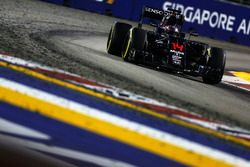Opinion: Forget a digital revolution, F1 needs better racing first
Amid talk of a digital revolution by new Formula 1 owner Liberty Media, Jonathan Noble argues that the sport needs to offer a better product on track first.

Photo by: Ferrari Media Center













More sponsors. More races. More Pay-TV. Gambling. More digital exploitation. A bigger push in Asia and the United States. Virtual Reality. Augmented Reality.
Having arrived as a shareholder and driving force for a supposed new Formula 1, Liberty Media has already offered us its vision of where it sees room to grow the sport, and especially boost its coffers.
Indeed, much of the room for expansion is in areas – like social media and the digital world – where F1 fell way behind the times and is now playing catch-up.
But one aspect where Liberty has been deafening through its silence is the one thing that every fan out there actually wants to see: better racing.
For let's face it, F1's current domination by Mercedes, and lack of general jeopardy to help underdogs pull off surprises, means that this current era of the sport is not going to go down in the history books as one of its best.
And that's before you take into consideration the voices concerned that 2017's rule could make things even worse.
Good racing has to be right at the heart of a successful F1. Fans tune in not to watch a procession on a Sunday afternoon, but to see good battles up and down the field.
It doesn't need overtaking on each lap, but there needs to be a certain level of unpredictability to it so that the result isn't pretty much decided by the exit of the first corner.
The 2016 season has been a campaign of good incidents, but not actually great races.
We will remember it more for sensational moments like the clashes between Lewis Hamilton and Nico Rosberg in Spain and Austria, Max Verstappen's stunning Barcelona win, than any of the intense battles that took place in the fight for the top step of the podium.
The thrillers we have had - like Monaco, Austria and Singapore - have been the exception rather than the rule.
Instead, we have pretty much known ahead of a race weekend that it will be a Mercedes lock-out at the front, and then either a Red Bull or Ferrari in third place. And, within 10 seconds of the start, the podium places can be pretty much picked out.
Compare that with MotoGP, which is enjoying a resurgence in popularity on the back of a super competitive fight at the front between Marc Marquez, Jorge Lorenzo, Valentino Rossi, Dani Pedrosa and the Ducati boys where the results are often unknown until right at the end. Throw in some underdog wins, and it has all the hallmarks of a classic era.
F1 remains the most popular form of motorsport on the planet in spite of itself, but you do wonder how much greater its reach could be if grands prix regularly delivered edge-of-the seat stuff.
Greater unpredictability, more teams and drivers in with a shout of success if they get it right, and an increased chance for the big boys to get it wrong, would certainly deliver added spice.
The benefits for F1 of delivering that are clear: more people tuning in, greater fan engagement – and therefore greater profit.
If the racing isn't there (and I certainly hope the 2017 doom-mongers aren't right and we have more than a one-horse race at the front next year), then it does not matter what you do around the edges: you can't squeeze extra cash out of those who have got bored and switched off.
It's a bit like owning a cinema. You can house it in the most beautiful building in the world, with the best digital booking system, the greatest seats, the finest popcorn, the best sound and the most crystal-sharp definition screen – but you will not get anyone buying tickets if you show terrible movies.
On the flip side, you can have a run down venue, with the need to queue up for tickets, bring your own popcorn only, but have an exclusive on the best blockbusters, you will sell out every time.
When you have the packed auditoriums, it's time to build up everything that goes around it.
For Liberty Media, ignoring the 'show' and simply hoping that, whatever happens out on track, fans will be willing to stump up for pay-TV or digital extras because they have done so for football, would be a big mistake.
Be part of Motorsport community
Join the conversationShare Or Save This Story
Subscribe and access Motorsport.com with your ad-blocker.
From Formula 1 to MotoGP we report straight from the paddock because we love our sport, just like you. In order to keep delivering our expert journalism, our website uses advertising. Still, we want to give you the opportunity to enjoy an ad-free and tracker-free website and to continue using your adblocker.















Top Comments